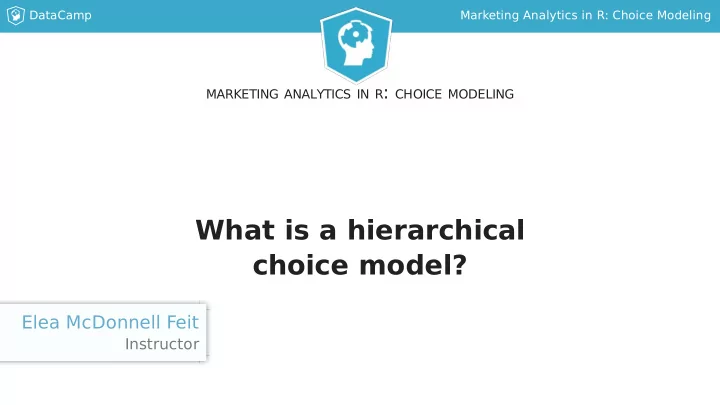

DataCamp Marketing Analytics in R: Choice Modeling MARKETING ANALYTICS IN R : CHOICE MODELING What is a hierarchical choice model? Elea McDonnell Feit Instructor
DataCamp Marketing Analytics in R: Choice Modeling Heterogeneity in preferences
DataCamp Marketing Analytics in R: Choice Modeling Hierarchical choice models (random coefficients models) for (i in 1:n_resp) { beta[i] <- mvrnorm(1, beta_0, Sigma) # random normal vector for (j in 1:n_task[i]) { X <- X[X$resp == i & X$task == j, ] u <- X %*% beta[i] p[i,] <- exp(u) / sum(exp(u)) } }
DataCamp Marketing Analytics in R: Choice Modeling Fitting a hierarchical multinomial logit model sportscar <- mlogit.data(sportscar, choice="choice", shape="long", varying=5:8, alt.var="alt", id.var = "resp_id") m7 <- mlogit(choice ~ 0 + seat + trans + convert + price, data = sportscar, rpar = c(price = "n"), panel = TRUE)
DataCamp Marketing Analytics in R: Choice Modeling Hierarchical model coefficients summary(m7) ... Coefficients : Estimate Std. Error z-value Pr(>|z|) seat4 -0.0185815 0.0762964 -0.2435 0.8075843 seat5 0.4259317 0.0751681 5.6664 1.458e-08 *** transmanual -1.2206527 0.0650133 -18.7754 < 2.2e-16 *** convertyes 0.2013760 0.0603982 3.3341 0.0008556 *** price -0.1914656 0.0092325 -20.7382 < 2.2e-16 *** sd.price 0.0230365 0.0327214 0.7040 0.4814209 Signif. codes: 0 ‘***’ 0.001 ‘**’ 0.01 ‘*’ 0.05 ‘.’ 0.1 ‘ ’ 1 Log-Likelihood: -1709.8 random coefficients Min. 1st Qu. Median Mean 3rd Qu. Max. price -Inf -0.2070035 -0.1914656 -0.1914656 -0.1759277 Inf ...
DataCamp Marketing Analytics in R: Choice Modeling Distribution of the price coefficient plot(m7)
DataCamp Marketing Analytics in R: Choice Modeling MARKETING ANALYTICS IN R : CHOICE MODELING Let's practice!
DataCamp Marketing Analytics in R: Choice Modeling MARKETING ANALYTICS IN R : CHOICE MODELING Heterogeneity in preference for other features Elea McDonnell Feit Instructor
DataCamp Marketing Analytics in R: Choice Modeling A different way to code factors Dummy coding (what we've been doing) seat4 seat5 2 0 0 4 1 0 5 0 1 Effects coding (better for hierarchical models) seat4 seat5 2 -1 -1 4 1 0 5 0 1
DataCamp Marketing Analytics in R: Choice Modeling Changing the coding for a factor contrasts(sportscar$seat) <- contr.sum(levels(sportscar$seat)) dimnames(contrasts(sportscar$seat))[[2]] <- levels(sportscar$seat)[1:2] contrasts(sportscar$seat) 4 5 2 -1 -1 4 1 0 5 0 1
DataCamp Marketing Analytics in R: Choice Modeling Making all the coefficients heterogeneous my_rpar <- c("n", "n", "n", "n", "n") m3 <- mlogit(choice ~ 0 + seat + trans + convert + price, data=sportscar) names(my_rpar) <- names(m3$coefficients) my_rpar seat4 seat5 transmanual convertyes price "n" "n" "n" "n" "n" m8 <- mlogit(choice ~ 0 + seat + trans + convert + price, data = sportscar, panel = TRUE, rpar = my_rpar)
DataCamp Marketing Analytics in R: Choice Modeling Hierarchical model parameters m8 <- mlogit(choice ~ 0 + seat + trans + convert + price, data = sportscar, panel = TRUE, rpar = my_rpar) plot(m8, par=c("seat4", "seat5")
DataCamp Marketing Analytics in R: Choice Modeling Coefficient for the base level m8$coef[1:2] seat4 seat5 -0.1852167 0.3519204 -sum(m8$coef[1:2]) [1] -0.1667037
DataCamp Marketing Analytics in R: Choice Modeling MARKETING ANALYTICS IN R : CHOICE MODELING Let's try it with the chocolate data!
DataCamp Marketing Analytics in R: Choice Modeling MARKETING ANALYTICS IN R : CHOICE MODELING Predicting shares with hierarchical models Elea McDonnell Feit Instructor
DataCamp Marketing Analytics in R: Choice Modeling Hierarchical model with correlations m10 <- mlogit(choice ~ 0 + seat + trans + convert + price, data = sportscar, rpar = myrpar, panel=TRUE, correlation = TRUE) cor.mlogit(m10) seat4 seat5 transmanual convertyes price seat4 1.0000000 -0.3411867 0.1584436 -0.3129433 0.1551497 seat5 -0.3411867 1.0000000 -0.1124484 0.1187094 -0.3206838 transmanual 0.1584436 -0.1124484 1.0000000 -0.6231883 0.7710748 convertyes -0.3129433 0.1187094 -0.6231883 1.0000000 -0.1165536 price 0.1551497 -0.3206838 0.7710748 -0.1165536 1.0000000
DataCamp Marketing Analytics in R: Choice Modeling Products we want to predict shares for prod seat trans convert price 1 2 manual no 35 2 2 auto no 30 prod.coded seat4 seat5 transmanual convertyes price 1 -1 -1 1 0 35 2 -1 -1 0 0 30
DataCamp Marketing Analytics in R: Choice Modeling Share prediction for hierarchical model mean <- m10$coef[1:5] # hard coded Sigma <- cov.mlogit(m10) share <- matrix(NA, nrow=1000, ncol=nrow(prod.coded)) for (i in 1:1000) { coef <- mvrnorm(1, mu=mean, Sigma=Sigma) utility <- prod.coded %*% coef share[i,] <- exp(utility) / sum(exp(utility)) } cbind(colMeans(share), prod) colMeans(share) seat trans convert price segment 1 0.1238315 2 manual no 35 basic 2 0.8761685 2 auto no 30 basic
DataCamp Marketing Analytics in R: Choice Modeling MARKETING ANALYTICS IN R : CHOICE MODELING Let's practice!
DataCamp Marketing Analytics in R: Choice Modeling MARKETING ANALYTICS IN R : CHOICE MODELING Goodbye and good luck! Elea McDonnell Feit Instructor
DataCamp Marketing Analytics in R: Choice Modeling Choices in building models Which attributes to include Treating numeric attributes as factors Interactions between attributes Interactions between attributes and decision-maker characteristics Hierarchical models Correlations between coefficients
DataCamp Marketing Analytics in R: Choice Modeling Other choice model features Distributions of random coefficients Probit models Nested logit Bayesian choice models (using the bayesm package or Stan)
DataCamp Marketing Analytics in R: Choice Modeling Advice for building models Always start by computing choice counts to summarize the data Build up from simple models to more complex If estimated parameters have very large standard errors, then you've probably added too much model complexity. Back up to a simpler model. For models describing human behavior, heterogeneity is usually a good idea
DataCamp Marketing Analytics in R: Choice Modeling MARKETING ANALYTICS IN R : CHOICE MODELING Go fit some choice models!
Recommend
More recommend